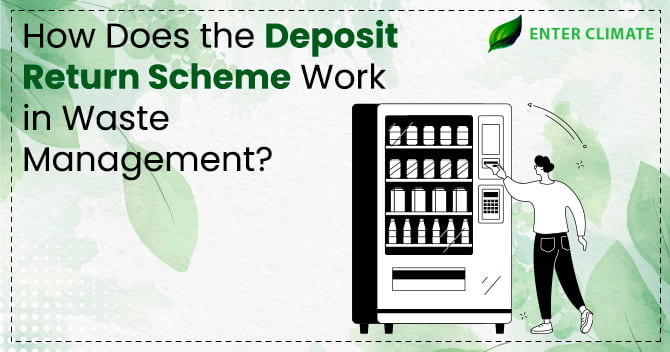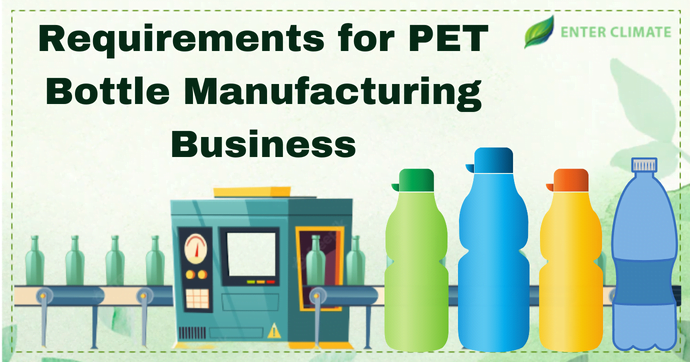How Does the Deposit Return Scheme Work in Waste Management
 29 Jul, 2022
29 Jul, 2022 
A Deposit Return Scheme or DRS is a system where customers are made to pay a refundable deposit of a small value along with the product’s price, which is repaid to them when they deposit the used product to a specified collection point. It is a mode of collection that has been in practice for many years in the beverage industry. The advantages of such a collection mechanism also invited the attention of other sectors searching for an effective collection mechanism for recovery of the waste product after the introduction of Extended Producer Responsibility (EPR) in plastic and e-waste management. The deposit return/ refund has been mentioned in the E-waste management Rules and the Plastic Waste Management Rules,2016 as a recommended approach for waste collection by the Producer, Importers and Brand owners (PIBO). Deposit return schemes have shown a high success rate in India in terms of recyclability if the data for water and beverage bottles are considered. Many countries, including India, are implementing DRS to collect single-use plastic waste and e-waste. DRS is often accompanied by data collection, allowing the processes to be monitored continuously.
Role of Deposit Return Scheme in Waste Management
Extended Producer Responsibility is now mandatory,and PIBOs have been given waste collection targets. EPR is, therefore, target-based and necessary to function in the country. Now any PIBO that introduces plastic packaging and electrical and electronic equipment in the Indian market is responsible for collecting and recycling the waste that the product generates. On the brighter side, the rules made provisions for managing this responsibility through the Producer Responsibility Organisation (PRO). Even if the manufacturers do not have the infrastructure for country-wide waste management, they can implement DRS with the assistance of PROs, traders and collection centers.
Benefits of DRS
End-of-life products are often valuable resources for the manufacturer. He can charge an additional amount as a deposit at the time of sale of the electrical and electronic equipment or plastic products and return the money to the consumer (along with interest) when the used-up product is returned to the collection point. A few significant benefits of implementing DRS in waste management have been outlined below.
- Promotes Authorised Recycling: collected materials are sent to authorised recyclers, ensuring the waste is recycled in an environment-friendly manner.
- Changes Consumer Behaviour toward waste: Adding monetary incentives to the waste creates value for the waste in the eyes of the user. This will lead to the consumer discarding waste in a way as intended by the collector.
- Makes EPR Easier: DRS helps PIBOs to create awareness for segregation of the waste at the source, which is an essential aspect of effective implementation of their EPR, be it plastic waste or e-waste
- Efficient collection of Plastic Waste and E-Waste: DRS is a way toward a sustainable waste management practice where a consumer is informed and becomes aware of waste disposal. He is incentivised for his positive actions and the waste also gets collected in an environmentally sound manner.
- Resource Recovery: DRS will benefit the PIBOs by reducing the overall cost of material recovery through recycling and fulfilling their EPR obligations simultaneously.
- Proven Results in Recycling: The Deposit Return Scheme has existed in India in the form of glass and plastic beverage bottles and cans and has proven successful among Indian consumers. A similar trend is also observed in the case of EEE, where the monetary value associated with the waste is much higher.
- Implement Changes: DRS can also assist the PIBOs in predicting consumer behaviour concerning what condition and how they discard their product. DRS can also ensure accurate and easy data traceability by PIBOs, who can then make valuable changes in their EPR Action Plans for the future.
Stakeholders in the Deposit Return Scheme
Apart from the PIBOs who introduce the product and the consumer who discards the product after its use, a few more stakeholders also have critical roles in the deposit return scheme for waste collection.
Environment Agencies: Central Pollution Control Board and State Pollution Control Boards(SPCBs)/ Pollution Control Committees (PCC)[1] create annual reports for waste management and oversee the EPR targets of PIBOs. These agencies grant authorisation to collectors to ensure that authorised PROs and collectors do the collection of waste.
Retailers: they can be essential in the DRS as they are the point where the consumer goes to buy, exchange or get the product repaired. Retailers can act as bulk collection points which will be useful in waste management as consumers can find it easy to go to the retailer rather than locate different collection centers to deposit the product. If the dealer has been made responsible for the collection, on behalf of PIBO, he must collect the waste and refund the amount as per take back or DRS arrangement.
PROs: A Producer Responsibility Organisation act as a bridge between manufacturer and recyclers. PROs can even do the collection on behalf of the PIBOs. PROs often have a pan-state or country-wide network of collection centers, and PIBOs can implement a Deposit Refund Scheme effectively through this network. Many PROs specialise in reverse logistics too.
Collection Centres/ Bulk Return Points: PIBOs can also set collection centers or bulk return points for the used products. They can automate the collection and refund process by installing Reverse Vending Machines (RVMs).
Conclusion
Any deposit return scheme must be based on an understanding of local situations and key processes in the waste management. Companies that want to fulfill their EPR obligations must inculcate successful DRS schemes into their EPR Action plans. PIBOs or PROs that manage on behalf of PIBOs can take the assistance of industry experts with knowledge of waste management to establish an effective DRS. A successful deposit return scheme will depend on how efficiently the collection, reverse logistics and cost-effective transportation are implemented.













